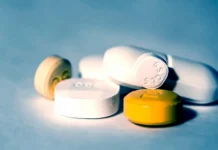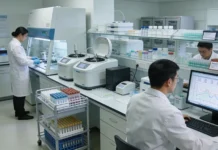National Institutes of Health (NIH) scientists studying an emerging coronavirus have found that a combination of two licensed antiviral drugs, ribavirin and interferon-alpha 2b, can stop the virus from replicating in laboratory-grown cells.
These results suggest that the drug combination could be used to treat patients infected with the new coronavirus, but more research is needed to confirm this preliminary finding. The study appears in the April 18, 2013, issue of Scientific Reports.
The new coronavirus, called nCoV, was first identified in Saudi Arabia in September 2012. As of April 16, 2013, the World Health Organization has reported 17 cases with 11 deaths, primarily in the Middle East. Although the case count is small, the new coronavirus has transmitted from human-to-human in situations where peopleŌĆömainly family membersŌĆöhave had close contact with those infected.
Because of the high fatality rate, scientists at NIH’s National Institute of Allergy and Infectious Diseases (NIAID) saw an urgent need to identify therapeutic options. In laboratory tests using cells from two species of monkey, the researchers found that either ribavirin or interferon-alpha 2b, drugs currently approved for hepatitis C therapy, inhibited nCoV from replicating when used individually. However, the required drug concentrations exceeded what is recommended for people. By combining the two antivirals, the scientists established an effective treatment dose at a drug level that is achievable in people. The NIAID researchers plan to confirm these results in a recently developed monkey model of nCoV infection.
┬Ā


















